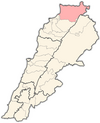Aydamun
Aydamun
عيدمون | |
|---|---|
Village | |
| Coordinates: 34°35′53″N 36°17′13″E / 34.59806°N 36.28694°E | |
| Country | Lebanon |
| Governorate | Akkar |
| District | Akkar |
| Elevation | 745 m (2,444 ft) |
| Time zone | UTC+2 (EET) |
| • Summer (DST) | UTC+3 (EEST) |
| Dialing code | +961 |
Aydamun (also spelled as Aidamoun or Aaidamoun)[1][2][3] is a Lebanese village.[4]
Location
[edit]It is located in Akkar District, about 30 minutes away from the governorate's capital Halba, and 3 hours from the capital Beirut.[4]
History
[edit]In 1838, Eli Smith noted ''Aidemun as a "Greek Christians" and Turkmen village, located east of esh-Sheikh Muhammed.[5]
Population
[edit]It has a population of about 4,000 people, 66% of whom are of Sunni Lebanese Turkmen origin. Christians comprise the remainder (80% are Greek Orthodox, and 20% are Maronite).[4] Due to its Turkish ethnic links, the village has received Turkish developmental assistance and funding. However, its Turkish links are not as strong as the nearby Turkish-populated village of Kouachra.[6] In 1966 the village had a population of about 300 people, and it was famous for producing Akkar carpets, which were home-produced by the local women.[7]
See also
[edit]References
[edit]- ^ a b "Aaidamoun – Chikhlar". Localiban. 19 May 2008. Retrieved 7 July 2015.
- ^ "Army Seizes Large Arms Cache at Depot in Akkar, Detains Syrians near Arsal". Naharnet. 28 March 2014. Retrieved 7 July 2015.
- ^ "UN: To avoid tensions with refugees, Lebanese hosts need support". IRIN. 28 January 2013. Retrieved 7 July 2015.
- ^ a b c Oytun Orhan (February 2010). "THE FORGOTTEN TURKS: TURKMENS OF LEBANON" (PDF). Center for Middle Eastern Strategic Studies. p. 9. Archived from the original (PDF) on 2016-03-05. Retrieved 28 June 2015.
- ^ Robinson and Smith, 1841, vol 3, 2nd appendix, p. 185
- ^ Oytun Orhan (February 2010). "THE FORGOTTEN TURKS: TURKMENS OF LEBANON" (PDF). Center for Middle Eastern Strategic Studies. p. 10. Archived from the original (PDF) on 2016-03-05. Retrieved 28 June 2015.
- ^ Robert Boulanger (1966). Boulanger, Robert (ed.). The Middle East: Lebanon, Syria, Jordan, Iraq, Iran. Hachette. p. 195.
Bibliography
[edit]External links
[edit]- Aaidamoun – Chikhlar, Localiban


